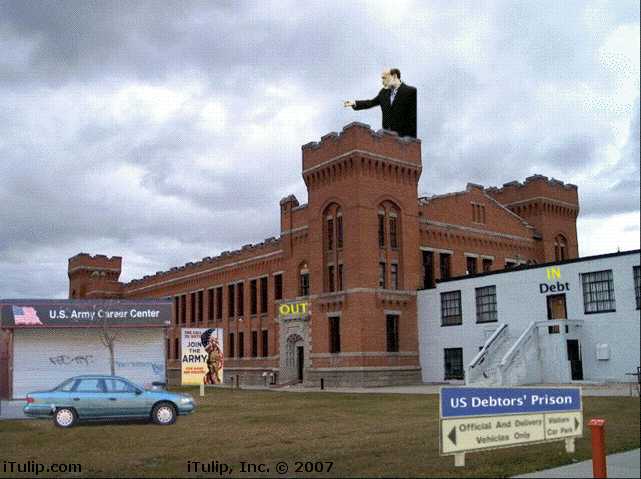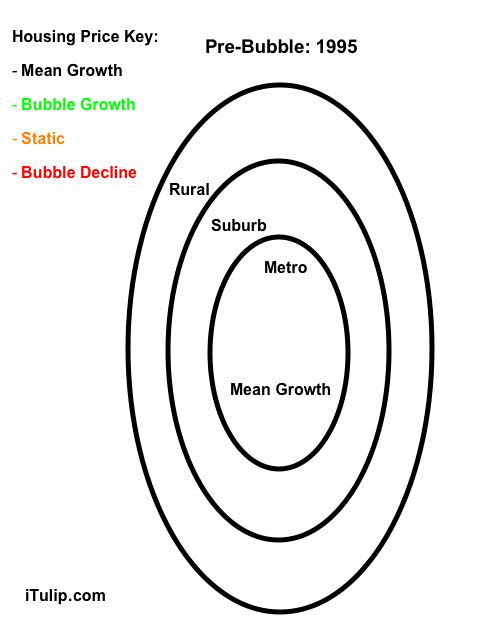 |
March 22, 2007 (P.J. Huffstutter - LA Times)
Colorado led the U.S. in foreclosures most of last year. The mood is grim in once-bustling Greeley.
The phones inside the Weld County public trustee's office ring insistently throughout the day, with questions from harried bank lenders and pleas from residents on the verge of losing their homes.
After relating their particular case, some callers ask the agency, which manages the sale of foreclosed properties for this city on the edge of the Front Range, the same questions: Just how bad is the housing market here? How much worse can it get?
The answers are usually grim.
For nine out of 12 months of 2006, Colorado led the nation in foreclosures — and this county suffered the worst of it for much of that time, according to research by Irvine-based firm RealtyTrac Inc.
As the nation's housing market falters amid the unraveling of the sub-prime mortgage industry, some real estate experts are looking to Colorado as a portent of what other parts of the country could face in coming months.
Housing oversupply and rising interest rates sank the market in Weld County, where mile after mile of pastel-hued suburban homes with neatly mowed lawns have sprung up in this longtime agricultural and meatpacking center, also the site of the University of Northern Colorado.
Home buyers with risky mortgages found themselves with mounting bills they couldn't afford. Those who were forced to sell couldn't find buyers, leading to thousands of residents defaulting on their loans.
In 2004, Weld County had 1,155 properties foreclosed, according to the public trustee's office. In 2006, there were 2,073.
The workload at the trustee's office has grown so heavy that county trustee Susie Velasquez plans to hire more workers to handle the boom in business.
"This is not the type of growth that any community wants," said Velasquez, whose staff members' desks are covered in piles of foreclosure files. "This is the type of growth you pray never happens to your town."
 |
The article above is evidence that our once ridiculed Geographic Housing Price Correction prediction is becoming self-evident.
The dynamic that drove prices outward was the need for workers in the cities and later the suburbs to escape high real estate prices, to move to where real estate was relatively cheaper and the cost of living lower, but still within an “affordable” commute. As homebuyers traveled farther from metro areas, they encountered lower real estate prices. At the extreme top of the market in late 2004 and early 2005, some home owners who bought property in the mid 1990s in market bubble areas before a housing bubble reached their region, sold their property at a huge profit, purchased equivalent property in size and quality in a rural area, and retired on the profit with perhaps a low wage retirement job. For example, home owners from Boston and nearby suburban towns, as well as from new York and Connecticut, sold their homes and purchased homes in Amherst and surrounding towns, 90 minutes from Boston and have retired using the profit on the transaction. However, most rural homebuyers who purchased at the top of the rural market in mid 2005 did so to have a chance to buy an affordable home. Of course, as more and more homebuyers searched farther away from metropolitan areas, prices increased in outlying areas as well until property values in rural areas reached historical peaks and experienced bubbles of their own.
Living in rural areas and working either in the suburbs or metropolitan areas increased commute time and expense, but this was affordable with gasoline under $1.50 per gallon as it was before hurricane Katrina. But combined increases in gasoline, heating oil, natural gas and propane prices plus higher interest payment on ARMs combined in mid 2005 to pushed many household budgets past the tipping point for those living in homes purchased in rural areas at or near the top of rural market housing bubbles.
Housing bubbles are driven by the same psychological factors that drive all late stage asset bubbles, the popular assumption that prices only rise. A steady drumbeat of negative press today, as evidence mounts that the boom is over, reinforces the negative price expectations, but nothing gets the fear juices flowing like watching home prices collapse in a neighboring town, or watching one’s neighbor lose his or her home.
This change in psychology will start to cause housing bubbles around suburban then metro areas to decline in a reversal of the process that drove prices from metropolitan markets outward to suburban and rural markets.
Fast-forward to now.Living in rural areas and working either in the suburbs or metropolitan areas increased commute time and expense, but this was affordable with gasoline under $1.50 per gallon as it was before hurricane Katrina. But combined increases in gasoline, heating oil, natural gas and propane prices plus higher interest payment on ARMs combined in mid 2005 to pushed many household budgets past the tipping point for those living in homes purchased in rural areas at or near the top of rural market housing bubbles.
Housing bubbles are driven by the same psychological factors that drive all late stage asset bubbles, the popular assumption that prices only rise. A steady drumbeat of negative press today, as evidence mounts that the boom is over, reinforces the negative price expectations, but nothing gets the fear juices flowing like watching home prices collapse in a neighboring town, or watching one’s neighbor lose his or her home.
This change in psychology will start to cause housing bubbles around suburban then metro areas to decline in a reversal of the process that drove prices from metropolitan markets outward to suburban and rural markets.
Foreclosures Force Suburbs to Fight Blight
March 23, 2007 (Erik Eckholm - New York Times)
SHAKER HEIGHTS, Ohio — In a sign of the spreading economic fallout of mortgage foreclosures, several suburbs of Cleveland, one of the nation’s hardest-hit cities, are spending millions of dollars to maintain vacant houses as they try to contain blight and real-estate panic.
Rosa Hutchison Yates of Shaker Heights, Ohio, may be losing her home of 30 years after a refinancing deal created bills she could not pay. “When folks pay for a home, they expect to die in it,” Ms. Yates said.
In suburbs like this one, officials are installing alarms, fixing broken windows and mowing lawns at the vacant houses in hopes of preventing a snowball effect, in which surrounding property values suffer and worried neighbors move away. The officials are also working with financially troubled homeowners to renegotiate debts or, when eviction is unavoidable, to find apartments.
“It’s a tragedy and it’s just beginning,” Mayor Judith H. Rawson of Shaker Heights, a mostly affluent suburb, said of the evictions and vacancies, a problem fueled by a rapid increase in high-interest, subprime loans.
“All those shaky loans are out there, and the foreclosures are coming,” Ms. Rawson said. “Managing the damage to our communities will take years.”
Mowing your neighbor's lawn? Who could have known?March 23, 2007 (Erik Eckholm - New York Times)
SHAKER HEIGHTS, Ohio — In a sign of the spreading economic fallout of mortgage foreclosures, several suburbs of Cleveland, one of the nation’s hardest-hit cities, are spending millions of dollars to maintain vacant houses as they try to contain blight and real-estate panic.
Rosa Hutchison Yates of Shaker Heights, Ohio, may be losing her home of 30 years after a refinancing deal created bills she could not pay. “When folks pay for a home, they expect to die in it,” Ms. Yates said.
In suburbs like this one, officials are installing alarms, fixing broken windows and mowing lawns at the vacant houses in hopes of preventing a snowball effect, in which surrounding property values suffer and worried neighbors move away. The officials are also working with financially troubled homeowners to renegotiate debts or, when eviction is unavoidable, to find apartments.
“It’s a tragedy and it’s just beginning,” Mayor Judith H. Rawson of Shaker Heights, a mostly affluent suburb, said of the evictions and vacancies, a problem fueled by a rapid increase in high-interest, subprime loans.
“All those shaky loans are out there, and the foreclosures are coming,” Ms. Rawson said. “Managing the damage to our communities will take years.”
Step D: Three years into the decline, marginal home buyers will learn what owning a home really costs, versus renting when housing prices are declining and jobs are more scarce. Rent is a fixed cost, whereas home ownership presents many variable costs, including increased interest payments on ARMs, and rising tax, insurance, and energy costs. Also, upkeep for the average home typically costs five to ten percent of the price of the home, annually. As prices fall, homeowners will have less access to home equity loans. Many will not be able to afford repair and maintenance expenses. Homes in some neighborhoods—and in some cases, entire neighborhoods—will begin to look neglected, further depressing prices.
- iTulip Housing Bubble Correction, January 2005
The equally predictable solution to this predictable disaster: more debt!- iTulip Housing Bubble Correction, January 2005
Ohio Plans Bonds to Bail Out Homeowners Strapped by Mortgages
March 23, 2007 (Martin Z. Braun - Bloomberg)
hio, which had the highest foreclosure rate among the 50 U.S. states at the end of 2006, plans to issue $100 million in taxable municipal bonds next month to help homeowners refinance mortgages they can't afford.
Proceeds of the bond issue by the Ohio Housing Finance Agency will provide financing for about 1,000 loans with a fixed rate of about 6.75 percent, said Robert Connell, the agency's director of debt management.
Next: States' fiscal management rules are changed to allow states to run deficits. You heard it here first!March 23, 2007 (Martin Z. Braun - Bloomberg)
hio, which had the highest foreclosure rate among the 50 U.S. states at the end of 2006, plans to issue $100 million in taxable municipal bonds next month to help homeowners refinance mortgages they can't afford.
Proceeds of the bond issue by the Ohio Housing Finance Agency will provide financing for about 1,000 loans with a fixed rate of about 6.75 percent, said Robert Connell, the agency's director of debt management.
iTulip Select: The inside scoop.
__________________________________________________
Special iTulip discounted subscription and pay services:
For a book that explains iTulip concepts in simple terms see America\'s Bubble Economy: Profit When It Pops

For a macro-economic and geopolitical View from Europe see Europe LEAP/2020
For macro-economic and geopolitical currency ETF advisory services see Crooks on Currencies
For macro-economic and geopolitical currency options advisory services see Crooks Currency Options
For the safest, lowest cost way to buy and trade gold, see The Bullionvault
To receive the iTulip Newsletter or iTulip Alerts, Join our FREE Email Mailing List
Copyright © iTulip, Inc. 1998 - 2007 All Rights Reserved
All information provided "as is" for informational purposes only, not intended for trading purposes or advice. Nothing appearing on this website should be considered a recommendation to buy or to sell any security or related financial instrument. iTulip, Inc. is not liable for any informational errors, incompleteness, or delays, or for any actions taken in reliance on information contained herein. Full Disclaimer


Comment